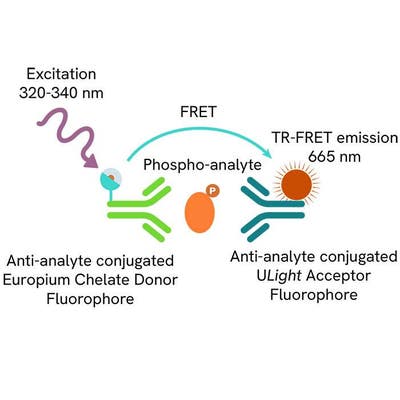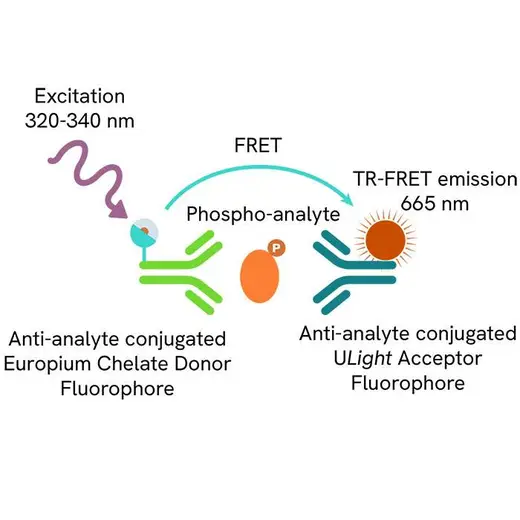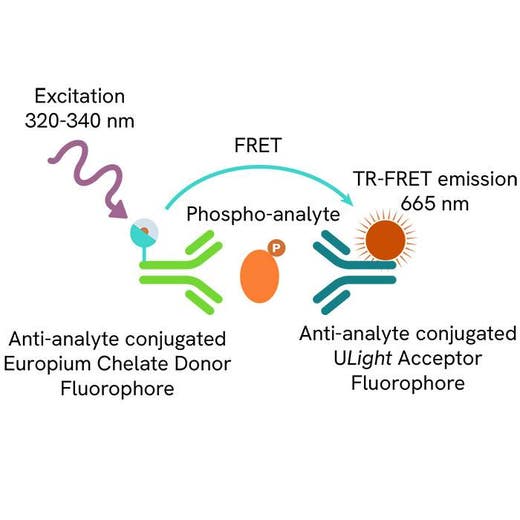
LANCE Ultra Phospho-NF-κB (Ser536) Detection Kit, 500 Assay Points

LANCE Ultra Phospho-NF-κB (Ser536) Detection Kit, 500 Assay Points




LANCE Ultra phospho-NFκB (Ser536) kits are designed for the detection of phosphorylated NFκB in cell lysates using a simple, homogeneous LANCE Ultra TR-FRET assay (no wash steps). This assay is compatible with both adherent and suspension cells.
For research use only. Not for use in diagnostic procedures. All products to be used in accordance with applicable laws and regulations including without limitation, consumption and disposal requirements under European REACH regulations (EC 1907/2006).
| Feature | Specification |
|---|---|
| Application | Cell Signaling |
| Sample Volume | 15 µL |
LANCE Ultra phospho-NFκB (Ser536) kits are designed for the detection of phosphorylated NFκB in cell lysates using a simple, homogeneous LANCE Ultra TR-FRET assay (no wash steps). This assay is compatible with both adherent and suspension cells.
For research use only. Not for use in diagnostic procedures. All products to be used in accordance with applicable laws and regulations including without limitation, consumption and disposal requirements under European REACH regulations (EC 1907/2006).


LANCE Ultra Phospho-NF-κB (Ser536) Detection Kit, 500 Assay Points


LANCE Ultra Phospho-NF-κB (Ser536) Detection Kit, 500 Assay Points


Product information
Overview
Please note control lysates are sold separately, catalog number TRF4019S.
Formats:
- Our 500 assay point kit allows you to run 500 wells in 384-well format, using a 20 µL reaction volume.
- Our 10,000 assay point kit allows you to run 10,000 wells in 384-well format, using a 20 µL reaction volume.
LANCE® and LANCE® (Lanthanide chelate excite) Ultra are homogeneous (no wash) TR-FRET (time-resolved fluorescence resonance energy transfer) technologies. One antibody of interest is labeled with a donor fluorophore (a LANCE Europium chelate) and the second antibody is labeled with an acceptor fluorophore [ULight™ dye]. Upon excitation at 320 or 340 nm, energy can be transferred from the donor Europium chelate to the acceptor fluorophore if sufficiently close for FRET (~10 nm). This results in the emission of light at 665 nm. Data are represented as ratiometric (665/615 nm X 10,000).
NFκB (Nuclear Factor kappa B) is a superfamily comprised of p65, RelB, c-Rel, p50/p105, and p52/p100. The combinations of these as either homo- or heterodimers help to regulate the immune system in response to infection or cellular stress. The classical NFκB pathway involves p65 and p50 activation and in stimulation of cytokines or activation of TLR. Phosphorylation at S536 has been shown to enhance transcriptional activity in the nucleus of cytokines as part of immune response. Several auto-immune disorders have been traced back to the deregulation of the NFκB pathway.
Specifications
| Application |
Cell Signaling
|
|---|---|
| Automation Compatible |
Yes
|
| Brand |
LANCE Ultra
|
| Cellular or Signaling Pathway |
NFκB
|
| Cellular Process |
NFκB
|
| Detection Modality |
LANCE
|
| Molecular Modification |
Phosphorylation
|
| Product Group |
Kit
|
| Sample Volume |
15 µL
|
| Shipping Conditions |
Shipped in Blue Ice
|
| Target |
NFκB
|
| Target Class |
Phosphoproteins
|
| Technology |
TR-FRET
|
| Therapeutic Area |
Metabolic
|
| Unit Size |
500 Assay Points
|
Resources
Are you looking for resources, click on the resource type to explore further.
Emerging pathways to neuroinflammation and neurodegeneration
Neurodegenerative diseases, such as amyotrophic lateral sclerosis...
LANCE™ Ultra TR-FRET is a no-wash proximity assay technology that combines the benefits of time resolution (TR) with fluorescence...
STAT3 is a particularly important therapeutic target since it is constitutively active in a range of cancer cells lines and human...


How can we help you?
We are here to answer your questions.






























